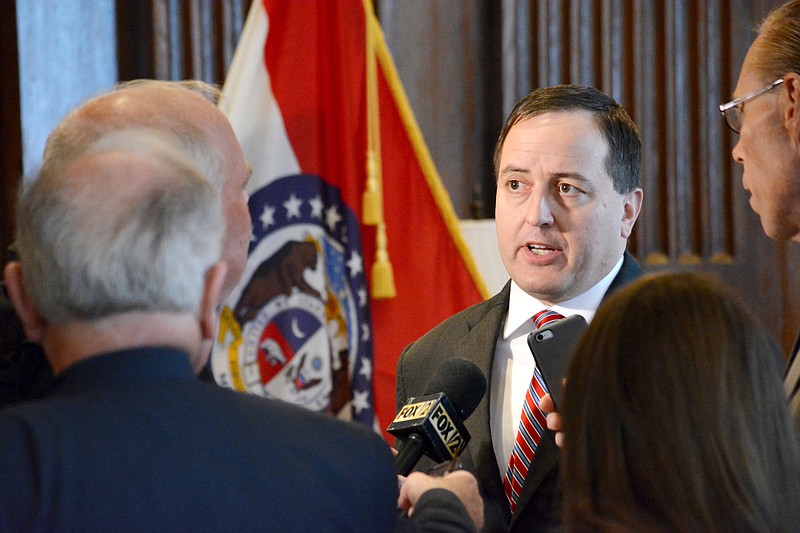Some state lawmakers are meeting with education officials through noon today at Lincoln University, in an education "retreat."
"The Hunt Institute has done this in West Virginia, North Carolina and Virginia," Secretary of State Jay Ashcroft explained. "They allowed me to be one of their fellows with the Hunt-Kean Leadership Fellows (last year, and) I got to know a little bit more about what they were doing to help really provide non-partisan data about what's working in different areas of the country."
So, Ashcroft said, he wanted to see Missouri host a meeting where state leaders and lawmakers could learn from a program that "wasn't really telling people what to do, but just making sure they had the knowledge to make good decisions."
The Hunt Institute of Durham, North Carolina - an affiliate of Duke University's Sanford School of Public Policy - was founded in 2001 and said in a news release that it "is a recognized leader in the movement to transform public education."
Javaid E. Siddiqi, Ph.D., is the institute's president and CEO, with nearly two decades of education experience including work as a high school teacher, principal and Virginia's secretary of education.
Siddiqi came to Jefferson City to help lead the two-day retreat which, he said, has a simple format.
"We try to put lawmakers in the same environment with (education) practitioners," he explained, "so they're going to be actually sitting in small groups with teachers and school leaders."
He also noted: "Public education can manifest itself in many different forms - (including) traditional and charter schools - so we try to tease out and engage with folks who want to work, on both sides of the aisle.
"It is heady work, and if they're not willing to work together and collaborate, we generally are not going to be attracted to, or want to work with, those types of states or state leaders."
Siddiqi said the retreat also serves as a way to explain to educators the kinds of problems and priorities that lawmakers face, when they "have to be able to move from 'Big Issue' to 'Big Issue' - and everybody expects their 'big issue' to be the lawmakers' 'big issue' too."
And, of course, that's not the reality for most lawmakers, he said.
Ashcroft, who worked as a teacher, engineer and lawyer before becoming Missouri's secretary of state two years ago, wants the program to be non-partisan.
"The core thing we have to worry about is, are our students getting a better education?" he told the News Tribune. "Are we making sure that every Missourian has that opportunity to get an education, to better themselves and be the best that they can be?"
State Education Commissioner Margie Vandeven agreed.
"(The retreat) provides a great opportunity for collaboration, where we're taking the time to really dig into the issues - way beyond the surface level," she said during a break in Thursday afternoon's program. "And hearing from different perspectives.
"I'm very optimistic that the focus seems to be on how do we serve our children in education the best way that we can as a state."
The Missouri Legislature's Education committee chairs served as co-chairs of the retreat.
Rep. Kathryn Swan, R-Cape Girardeau, said she hoped the retreat would spark important discussions about the future of education.
"As we're looking at workforce (needs) and at K-12 education - and looking at higher education or post-secondary education," she said, it's important for "all of us to have a big conversation about removing any learning barriers that we might have for students - whether that's early childhood students or those are adult students who are working.
Swan said educators and lawmakers must work together "to talk about all aspects of education, from early childhood to adult learning, and what we can do to help improve educational levels - so people can find a job that is rewarding for their family and for their family life."
Sen. Gary Romine, R-Farmington, added: "I have been able to participate in Career Tech-Ed over the last couple of years (and) the governor's desire for workforce development fits right into that.
"But we want to make sure that we start with K-12, and make sure our education evolves (so that) it all works together (and is) all linked together.
"And, so, we want to have a total picture of what our education should look like."
Lt. Gov. Mike Kehoe also served as a co-chair, and said in a news release: "Missouri's economic and civic future relies on the strength of our education system.
"I am encouraged by the willingness of our leaders to dive into these difficult conversations and work together to secure the future of our state."
Ashcroft was born in Jefferson City and graduated from Jefferson City High School.
In the years since his own schooling, the secretary of state said, "I think education has become more difficult.
"I think societal problems - (especially) the break-down of the family structure - has made it much more difficult. The greatest predictor of student achievement at school is parental involvement."
That comment was echoed by others during a discussion of the role charter schools can play in education - one of seven topics being explored during the two-day retreat.
The other topics included: setting visions, early childhood education, school leadership, teacher compensation, "rethinking high school" and "tomorrow's workforce."
Ashcroft said: "Regardless of where you are on the political spectrum or who your representative or state senator is, I believe everyone in the Capitol cares about the education of Missouri students.
"And working together, we can make a real difference."

